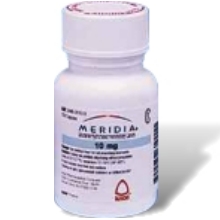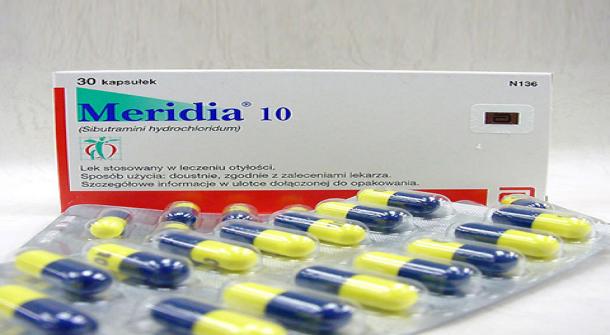Review of Sibutramine (Meridia ) Weight Loss Drug
Brand Name: Meridia
Generic Name: Sibutramine HCl Monohydrate
Meridia [Sibutramine HCl monohydrate]
 This oral medication is approved for the treatment of obesity.
This oral medication is approved for the treatment of obesity.
Sibutramine hydrochloride monohydrate is an SNRI; it inhibits the reuptake of serotonin and norepinephrine, making higher levels of these chemicals available in the brain.
Serotonin is related to moods, sleep, and appetite; while norepinephrine is linked to alertness, attention, and moods.
While inducing a calming effect, Sibutramine also creates a feeling of fullness in an individual, which does not make a person crave for food.
Uses of Generic Meridia
Meridia is used to treat obese persons, to help them lose weight, but is recommended for individuals who have a body mass index [BMI] of 30 or higher.
In the case of hypertensive, diabetic individuals, or those who have high cholesterol levels, the BMI should be at least 27, if they wish to take this medicine.
The medicine must be accompanied with exercise and diet control to yield maximum results.
Adolescents between 16-18 may take the medicine if specifically advised by their doctor.
Dosage of Generic Meridia
Your doctor will decide the dose that suits you best, keeping in mind your overall medical condition. Take the medicine exactly as prescribed. It has to be taken once daily, with a glassful of water, but if it upsets your stomach, it can be taken with food.
Missed Dose of Generic Meridia
Since it’s a single dose, you are unlikely to miss it; in case you do so, then take the missed dose as soon as you can, but don’t double your dose.
Side-effects of Generic Meridia
Some of the common, less serious side effects can include:-
- Insomnia
- Constipation, or conversely diarrhea
- Headache/migraines
- Loss of appetite, or conversely increased appetite
- Increased menstrual cramps/pain
- Dry mouth
- Runny nose, or sinus infection
- Sore throat
- Joint/muscular pain
- Flu symptoms – fever, chills, and body ache
An allergic reaction such as:- itching, rash, any unusual swelling, wheezing, or difficulty in breathing, means that you should stop the medicine and ask your doctor for help.
Overdose of Generic Meridia
If you think you’ve overdosed, contact your local poison control center or emergency room at once. US residents can call the US national poison hotline at 1-800-222-1222.
Symptoms can include:
- rapid heartbeat,
- high blood pressure,
- headache and
- dizziness.
Interactions of Generic Meridia
Some of the medicines with which Ultracet interacts, are:-
- Other weight-loss medicines like Phentermine.
- SSRI or SNRI anti-depressants like Citalopram, Duloxetine, Escitalopram, Fluoxetine, Milnacipran, or Paroxetine.
- MAOI antidepressants like Phenelzine, or Tranylcypromine.
- MAOI-B medicines for Parkinson’s disease such as Selegiline.
- Tricyclic antidepressants like Amoxapine, Desipramine, or Doxepin.
- Narcotic pain killers such as Meperidine, or Pentazocine
Storage of Generic Meridia
After you buy Meridia, store it at a room temperature of 15oC-30oC, safe from heat, light and dampness. Keep it out of reach of children and pets.
Precautions of Generic Meridia
Your weight will need to be regularly monitored when you take this medicine.
Ask your doctor to prescribe a low-calorie diet and exercise regime for you.
It is recommended that you do not attempt to treat yourself by taking, increasing, decreasing, or stopping the medicine on your own.
Do not share this medicine with anyone even if they have similar symptoms it can do more harm than good to them.
Notes of Generic Meridia
Read the Patient Information every time you buy a refill – it may have some new information.
Your physician will be able to tell you more about the uses, side effects, interactions, and precautions associated with this medication.
IMPORTANT: Discard any unused medicine after treatment is over.







